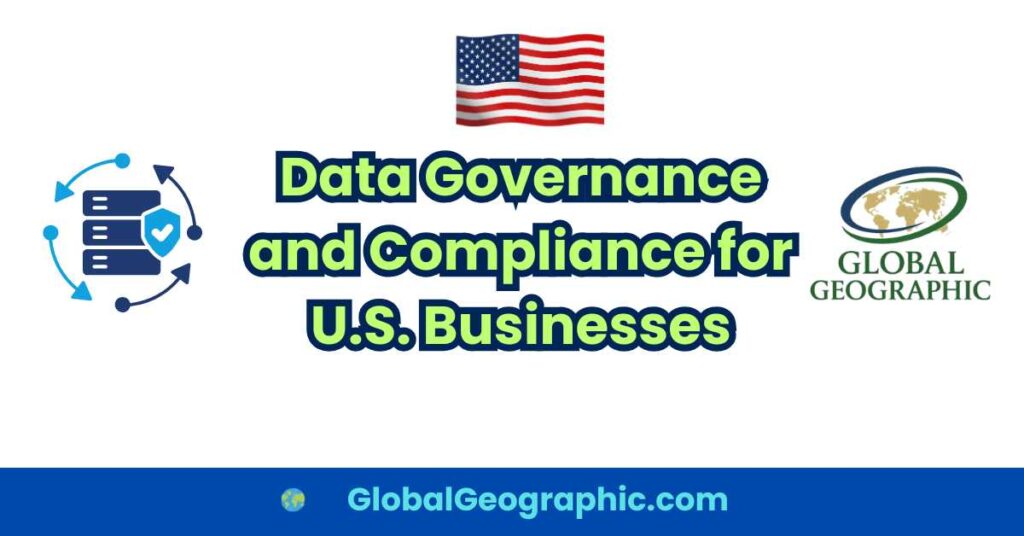
Data Governance and Compliance for U.S. Businesses
By Sameer C, Co-Founder, Global Geographic Inc.
In today’s digital economy, data is one of the most valuable assets a business can have. But with that value comes responsibility. U.S. businesses face increasing pressure from regulators, customers, and stakeholders to handle data responsibly — not only to protect privacy, but also to maintain trust and avoid costly legal consequences.
That’s where data governance and compliance come in.
With 15+ years of experience in business analysis and implementing enterprise solutions, I’ve seen firsthand how businesses struggle when data governance is treated as an afterthought. It’s not just about having the right tools — it’s about building a culture and process that ensures data is accurate, secure, and used ethically.
📌 What Is Data Governance?
Data governance is the framework that defines how an organization manages its data. It covers:
- Data Quality – Ensuring accuracy, completeness, and consistency
- Data Security – Protecting data from unauthorized access or breaches
- Data Lifecycle Management – Managing data from creation to deletion
- Roles and Responsibilities – Defining who owns, manages, and uses the data
- Policies and Standards – Setting clear rules for data handling and usage
In simple terms, data governance ensures that the right people have the right data, at the right time, for the right purpose.
📌 Why Compliance Matters for U.S. Businesses
Compliance ensures your data practices align with laws and regulations. In the U.S., depending on your industry and location, you may need to comply with:
- CCPA (California Consumer Privacy Act) – Governs consumer data rights in California
- HIPAA (Health Insurance Portability and Accountability Act) – For healthcare data privacy and security
- GLBA (Gramm-Leach-Bliley Act) – For financial institutions handling customer information
- SOX (Sarbanes-Oxley Act) – For corporate financial data accuracy and accountability
- State-Level Data Breach Laws – Vary across states, requiring prompt breach notifications
Failing to comply can lead to heavy fines, lawsuits, and reputational damage.
📌 The Link Between Governance and Compliance
Data governance provides the structure that makes compliance sustainable. Without governance, compliance becomes a reactive, checklist-driven task — which often fails when regulations change or new risks emerge.
For example, if you have strong governance processes for data classification, meeting requirements for GDPR or CCPA becomes much easier because you already know where sensitive data is stored, who can access it, and how it’s protected.
📌 Building an Effective Data Governance Framework
Based on my experience working with diverse organizations, here are the key steps to establish strong governance and ensure compliance:
1. Executive Buy-In and Culture Change
Governance isn’t just an IT issue — leadership must champion data responsibility across the organization.
2. Data Inventory and Classification
Know what data you have, where it resides, and its sensitivity level.
3. Policies and Procedures
Establish clear guidelines for data collection, storage, access, and disposal.
4. Access Controls and Security Measures
Implement role-based access, encryption, and monitoring tools.
5. Regular Audits and Training
Conduct periodic reviews to identify risks and keep staff updated on best practices.
6. Leverage Technology Wisely
Use governance and compliance tools, but remember — technology supports governance, it doesn’t replace it.
📌 The Competitive Advantage of Governance
Strong governance and compliance do more than just keep you out of trouble. They:
- Build customer trust by showing you value privacy and security
- Improve decision-making by ensuring data accuracy and reliability
- Reduce costs from inefficiencies, errors, and breaches
- Support innovation by enabling safe and ethical use of emerging technologies like AI
✅ Final Thoughts
For U.S. businesses, data governance and compliance are no longer optional — they’re strategic necessities. By investing in governance today, you’re not just meeting regulations, you’re building a foundation for sustainable growth and resilience.
At Global Geographic Inc., we help organizations not only understand their data but also use it responsibly, turning compliance from a burden into a business advantage.